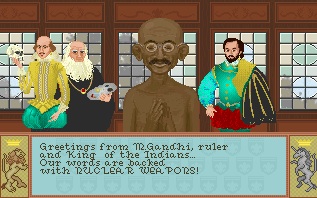Fans of the incredibly popular series of computer games called Civilization will recall the strange acts of diplomacy in the early iterations of the game. For instance, whenever a rival civilization joined the nuclear club, it would always mention that fact at the beginning of any negotiation. This would result in rather awkward situations, such as Gandhi casually mentioning that he's packing some serious heat.

Diplomacy in subsequent editions became more sophisticated and realistic, but even this primitive form of diplomacy carries a hint of truth about modern international relations: countries seek nuclear weapons not necessarily because they plan to use them, but because they believe it gives them leverage.
That's why all the worry over Iran's nuclear program, mostly from neoconservatives, is largely misplaced. The consensus in the foreign policy community is that Iran is an aggressive, rational actor. Unlike al-Qaeda or other terrorists, they aren't suicidal. The Persians want power and influence, particularly in the Middle East, and nuclear weapons are a means to achieve that end. As Barry Rubin writes for the Jerusalem Post:
[Iran's] basic goal was and is to be as powerful a regional hegemon as possible - including control over Syria and Lebanon. It would like to take leadership of all Muslims in the area...Nuclear weapons are thus for Iran primarily a defensive shield enabling it to carry out conventional aggression with impunity.
This is also why "Rouhanimania," overly optimistic enthusiasm about Iran's new president, is also misplaced. Like former President Mahmoud Ahmadinejad, Mr. Rouhani also wants Iran to be a powerful country, and he very likely believes that nuclear weapons are an appropriate avenue to achieve that end. Therefore, the only real difference between Mr. Rouhani and Mr. Ahmadinejad is that the former has a thicker beard and friendlier rhetoric. Iran's regional ambitions, however, haven't changed much.
Besides, even if Mr. Rouhani sincerely doesn't want nuclear weapons, Supreme Leader Ali Khamenei (despite his alleged fatwa) probably does. And, as we learned recently, Mr. Rouhani appears not to even have the authority to shake President Obama's hand.
One is left to wonder how much power, if any, Mr. Rouhani actually possesses.
Regardless of the answer to that question, one thing is definitely clear: Mr. Rouhani will be taken far more seriously if his words are backed with nuclear weapons.
(Image: TVTropes.org)











